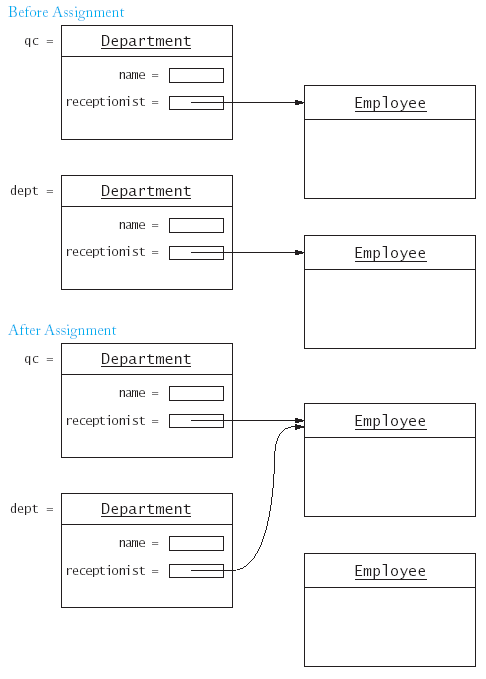
// department0.cppПроменяме конструктора на класа, като там конструираме обект - член-данна на класа.
#include <string> #include <iostream> using namespace std; #include "ccc_empl.h" /**
A department in an organization. */ class Department { public: Department(string n); void set_receptionist(Employee* e); void print() const; private: string name; Employee* receptionist; }; /** Constructs a department with a given name. @param n the department name */ Department::Department(string n) { name = n; receptionist = NULL; } /** Sets the receptionist for this department. @param e the receptionist */ void Department::set_receptionist(Employee* e) { receptionist = e; } /** Prints a description of this department. */ void Department::print() const { cout << "Name: " << name << "\n" << "Receptionist: "; if (receptionist == NULL) cout << "None"; else cout << receptionist->get_name() << " " << receptionist->get_salary(); cout << "\n"; } int main() { Department shipping("Shipping"); Department qc("Quality Control"); Employee* harry = new Employee("Hacker, Harry", 45000); shipping.receptionist(harry); Employee* tina = new Employee("Tester, Tina", 50000); qc.set_receptionist(tina); tina->set_salary(55000); shipping.print(); qc.print();
delete harry;
delete tina;
return 0; }
class Department {
...
private:
string name;
Employee* receptionist;
};
Department::Department(string n, Employee e)
{
name = n;
receptionist = new Employee(e.get_name(), e.get_salary());
}
/* second constructor */
Department::Department(string n)
{
name = n;
receptionist = NULL;
}
** Деструктор
Деструктор е специална член-функция, която се извиква автоматично
когато обектът излезе от обхват.
Деструкторът на класа Department трябва да унищожи
създадения от конструктора обект:
** Предефиниране на операция присвояване
Нека имаме следните дефиниции:
Department qc("Quality Control", Employee("Tester, Tina", 50000));
Department dept("Shipping", Employee("Hacker, Harry", 35000));
и след това приложим операция присвояване (почленно копиране):
dept = qc;
1. Това присвояване води до загуба на памет (memory leak) - имаме
недостъпен обект (от тип Employee)!
2. Когато един от обектите (qc или dept) излезе
от обхват (и изтрие обекта), получаваме висящ указател (dangling
pointer)!
Затова трябва да предефинираме операция присвояване за обекти от класа Employee
Department& Department::operator=(const Department& b)
{ if (this != &b)
{ name = b.name;
delete receptionist;
if (b.receptionist == NULL) receptionist == NULL;
else
receptionist = new Employee(b.receptionist->get_name(),
b.receptionist->get_salary());
}
return *this;
}
- Променяме данните, които не са указатели (в случая name)
от обект b в обект *this;
- Изтриваме указателя receptionist от *this
(текущия обект) и
- Създаваме нов обект от тип Employee за *this,
копие на обекта *receptionist от
параметъра (десния аргумент на операцията) b.
Функцията за предефиниране трябва да е член-функция (защо?).
** Конструктор за копиране
Предназначението на операция присвояване е да промени съществуващ
обект, като го направи същия като друг обект и не е подходяща за
конструиране на нов обект.
Например в оператора за дефиниране на обект:
Department dept = qc; // not assignment operator!
не може да се използва (и не е!) операция присвояване.
Правилното конструиране на обект, копие на друг обект е:
Department dept(qc);
т.е. като се извика конструктор за копиране.
За всеки клас в езика С++ има такъв конструктор, но той действа с
почленно копиране и възникава същия проблем, както при операция
присвояване.
Решението е да се напише конструктор за копиране:
Department::Department(const Department& b)
{ name = b.name;
if (b.receptionist == NULL) receptionist = NULL;
else
receptionist = new Employee(b.receptionist->get_name(),
b.receptionist->get_salary());
}
Конструктор за копиране се вика и когато се предава
параметър-стойност на функция, напр.
void print(Department d)
{ ... }
Department dep("Administration")
...
print(dep);
....
Пример:
// department.cppКогато използваме указатели (и динамична памет) в данните на клас, винаги трябва да дефинираме "големите три":
001: #include <string> 002: #include <iostream> 004: using namespace std; 005: 006: #include "ccc_empl.h" 008: /** 009: A department in an organization. 010: */ 011: class Department { 013: public: 014: Department(string n); 015: Department(string n, Employee e); 016: ~Department(); 017: Department& operator=(const Department& b); 018: Department(const Department& b); 019: void print() const; 020: private: 021: string name; 022: Employee* receptionist; 023: }; 024: 025: /** 026: Constructs a department with a given name and no receptionist. 027: @param n the department name 028: */ 029: Department::Department(string n) 030: { name = n; 032: receptionist = NULL; 034: cout << "Constructor: "; 035: print(); 036: } 037: 038: /** 039: Constructs a department with a given name and receptionist. 040: @param n the department name 041: @param e the receptionist 042: */ 043: Department::Department(string n, Employee e) 044: { name = n; 046: receptionist = new Employee(e.get_name(), e.get_salary()); 048: cout << "Constructor: "; 049: print(); 050: } 051: 052: /** 053: Deletes the Employee object that this Department 054: object manages. 055: */ 056: Department::~Department() 057: { cout << "Destructor: "; 059: print(); 061: delete receptionist;
062: } 063: 064: /** 065: Constructs a Department object as a copy of another 066: Department object. 067: @param b the object to copy 068: */ 069: Department::Department(const Department& b) 070: { cout << "Copy constructor: "; 072: b.print(); 073: 074: name = b.name; 075: if (b.receptionist == NULL) receptionist = NULL; 077: else 078: receptionist = new Employee(b.receptionist->get_name(), 079: b.receptionist->get_salary()); 080: } 081: 082: /** 083: Sets this Department object to a copy of another 084: Department object. 085: @param b the object to copy 086: */ 087: Department& Department::operator=(const Department& b) 088: { cout << "Assignment: "; 090: print(); 091: cout << "= "; 092: b.print(); 093: 094: if (this != & b) 095: { name = b.name; 097: delete receptionist; 098: if (b.receptionist == NULL) receptionist = NULL; 100: else 101: receptionist = new Employee(b.receptionist->get_name(), 102: b.receptionist->get_salary()); 103: } 104: return *this; 105: } 106: 107: /** 108: Prints a description of this department. 109: */ 110: void Department::print() const 111: { cout << "[name=" << name << ",receptionist="; 113: if (receptionist == NULL) cout << "NULL"; 115: else cout << receptionist->get_name(); 117: cout << "]\n"; 118: } 119: 120: int main() 121: { Department shipping("Shipping"); 123: Department qc("Quality Control",
124: Employee("Tester, Tina", 50000)); 125: Department dept(qc);
126: dept = shipping; 127: return 0; 128: }